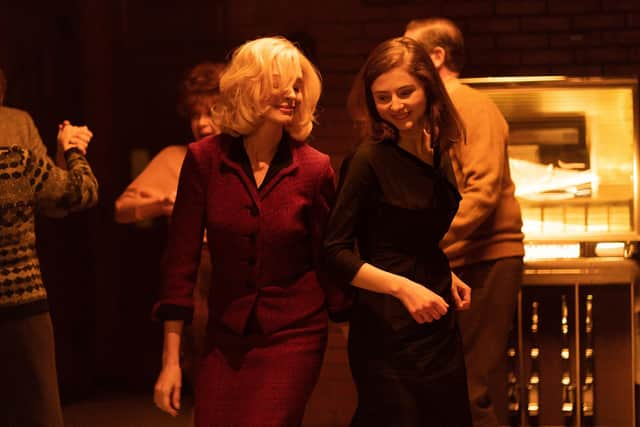Film reviews: Eileen | Genie | Fallen Leaves
Eileen (15) ****
Genie (PG) *
Fallen Leaves (12A) ****


Based on Ottessa Moshfegh’s Booker-nominated novel of the same name, Eileen is an entertainingly grubby Hitchcockian throwback, noir-tinged and stylish, but shot through with a grungier sensibility that echoes both the New Hollywood renaissance of the early 1970s and the more transgressive films of the early 1990s American indie scene. Directed by Brit filmmaker William Oldroyd (whose darkly sexual debut, Lady Macbeth, gave Florence Pugh her first lead), and co-written by Moshfegh and Luke Goebel, the film gives rising star Thomasin Mackenzie (Leave No Trace, Last Night in Soho) her best role yet as the titular Eileen, an outwardly shy woman with sex and murder on her mind as she negotiates the strictures of suburban Boston during the run up to a snowy Christmas in 1964.
The seasonal setting – and the redemptive narrative it implies – adds to the film’s sordid edge, intensifying Eileen’s quiet despair as the primary caregiver for her widowed father (Shea Whigham), an alcoholic ex-cop given to pointing his gun at the neighbourhood kids and shooting his mouth off about the place women should occupy in society. The latter is something to which Eileen’s disregard for personal hygiene and the spirit-dulling sanctity of marriage (her favoured older sister’s route out), is a daily affront. Mousy and secretive, she works instead as a secretary at a juvenile detention centre, where disapproving older colleagues are final destination reminders of a path in life she doesn’t want to follow and younger guards are the fuel she needs for the furtive onanistic fantasises she frequently indulges in when no one’s looking.
Advertisement
Hide AdIn old-school noir style, the film opens with Eileen shrouded in smoke, but the smoke is soon revealed to be the result of her faulty car; an all-American symbol of freedom and escape now just one more toxic environment for her to navigate as she dreams about killing her father and becoming the sort of person who, in the words of her dad, isn’t just “filling space”. This transformation begins with the arrival at work of a new psychologist, Dr Rebecca St John, a Harvard-educated, exotically glamorous blonde, whose flattering spell Eileen immediately falls under. Played by a terrific Anne Hathaway, the character – named by Moshfegh for Hitchcock’s Rebecca – is pure movie fantasy and Hathaway relishes the chance to play her that way: an impossibly sophisticated femme fatale, flirty, scandalous, aloof and impervious to the demands and expectations of others.
There’s a sexual undercurrent to their nascent friendship too, not least in the infatuation Eileen immediately forms for this assured, sensuous older woman, who basks in her attention and delights in rejecting the unappealing male prospects in the dive bar they frequent as they’re getting to know each other. It’s something that’s attracted comparisons – both positive and negative – to Todd Haynes’ lesbian drama Carol, but while both films would certainly make for an intriguing, Christmas-themed double bill, there’s more going on here than another tale of sexual awakening. Rebecca’s interest in one of the young inmates in the prison leads to a violent twist that disrupts the narrative flow in a gleefully perverse way, bringing a kind of tawdry reality to the outlaw fantasy we’ve been watching take shape. Signalling a shift in the power dynamic between Rebecca and Eileen, it takes the film in a much more ambiguous direction, one that so ruthlessly eschews the narrative bloat that ruins so many movies it almost leaves you feeling short-changed, until you realise this is actually how grown-up cinema used to operate. Audacious and bold, it’s the perfect feel-bad movie for the festive season.


Speaking of which, Love, Actually creator Richard Curtis returns to heap further cinematic misery on Christmas movie fans with Genie. Dusted off from a British TV movie he penned in 1991, and updated to a contemporary New York setting, it’s essentially a joke-impoverished vehicle for Melissa McCarthy to do an Elf which sees her cast her as wish-dispensing genie and having her comment on how crazy modern life seems after being trapped in a magical jewel box for 2,000 years. The last time she was out she hung out with baby Jesus – now she’s going to a Tom Cruise movie and shouting at the screen while he jumps off buildings (“This mission is impossible! It’s in the title!” She yells, unfunnily). Of course, there needs to be a gooey family message too, so she’s also putting her rule-contingent powers to use helping workaholic, newly-fired antiques expert Bernard (Papa Essiedu) reconnect with his estranged family. In a nod to the earlier film, Alan Cumming (who played Bernard) hams things up as Bernard’s Scrooge-like boss. As terrible as it sounds.
Finnish auteur Aki Kaurismäki returns with Fallen Leaves, another deadpan delight, this time built around a burgeoning romance between an exploited supermarket worker (Alma Pöysti) and a construction worker (Jussi Vatanen). They’re engaged in an arch, Brief Encounter-style romance, one fuelled by trips to the cinema, but complicated both by the realities of their individual lives (her precarious employment, his unchecked drinking), and the wider existential dread brought on by the war in Ukraine, news of which filters into their lives every time they turn on the radio. Kaurismäki handles it all in typically sardonic style and fills the film with amusing cinematic references, including a sly nod to his closest American contemporary, Jim Jarmusch.
Eileen and Fallen Leaves are in cinemas from 1 December. Genie screens on Sky Cinema from 1 December.